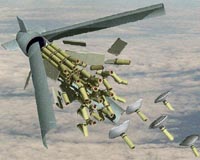| . |  |
. |
Chittagong, Bangladesh (AFP) Feb 22, 2010 Bangladesh's ship breaking yards ground to a halt Monday as some 30,000 workers protested a government decree aimed at improving environmental standards in the industry, police said. Under a government order issued in late January, ships heading for breaking yards must now be certified as toxic chemical-free before they are imported and scrapped. "Ship breakers are demanding the order be reversed and 30,000 ship breaking workers are protesting with a massive rally in the centre of Chittagong," said local police chief Monirul Islam, referring to Bangladesh's second-largest city. The order comes after a boom year for ship breakers, with the number of yards growing to around 100 from just 40 in early 2009 and turnover hitting a record 700 million dollars. With no natural iron ore deposits, Bangladesh is dependent on recycled steel for its fast-growing economy. Some 45 percent of the world's ship breaking happens on the southeastern Sitakundu coast. "The government order is tantamount to a death sentence for the industry," said Jafar Alam, head of the Bangladeshi ship-breakers association. "Tens of thousands of workers will lose their jobs because of the order," he said. The industry employs an estimated 40,000 people. Activists hailed the government's order as the "biggest achievement in many years" in their battle to enforce environmental and work safety standards in the yards. "Now the yards cannot import ships that contain deadly toxic waste like asbestos, mercury and PCPs," said Mohammad Ali Shaheen, the local head of the rights group coalition, NGO Platform on Ship breaking. "It will ensure the safety of the workers who were made to clean up these pollutants with their bare hands. The government has proved that it's stronger than the ship breakers and I hope it won't back off from this stand." Last year, 26 people were killed at the ship breaking yards, a figure that NGOs say is a huge underestimate, as it only counts on-site accidents and does not include workers who were laid off after being sickened by toxic chemicals. Ships heading for Bangladesh routinely contain chemicals banned in many developed countries such as asbestos.
Share This Article With Planet Earth
Related Links Our Polluted World and Cleaning It Up
 Cluster bomb ban reaches ratification: UN
Cluster bomb ban reaches ratification: UNUnited Nations (AFP) Feb 16, 2010 The United Nations announced Tuesday that a 30th country had signed on to the international convention banning cluster bombs, paving the way for the document to come into force on August 1. "The United Nations received today the 30th instrument of ratification for the Convention on Cluster Munition," said a statement from Secretary General Ban Ki-moon's press office. "The Secretary-Gener ... read more |
|
| The content herein, unless otherwise known to be public domain, are Copyright 1995-2010 - SpaceDaily. AFP and UPI Wire Stories are copyright Agence France-Presse and United Press International. ESA Portal Reports are copyright European Space Agency. All NASA sourced material is public domain. Additional copyrights may apply in whole or part to other bona fide parties. Advertising does not imply endorsement,agreement or approval of any opinions, statements or information provided by SpaceDaily on any Web page published or hosted by SpaceDaily. Privacy Statement |